 |
| |
MI6 got to attend "The Orange Word" Screen
Writers Season 2004, and can bring you the full transcript
from the interview. In this in depth talk Neal Purvis
and Robert Wade discuss Bond, their careers, loves
and pet hates of film...
|
|
Interview - Neal Purvis and Robert Wade (Part
2)
23rd March 2004
MI6 got to attend "The Orange Word" Screen Writers
Season 2004, and can bring you the full transcript from the interview.
In this in depth talk Neal Purvis and Robert Wade discuss Bond,
their careers, loves and pets hates of film...
Continuing...
Peter Florence (Chair): [The Sweet Smell of Success]...
it was written by Ernest Lehman?
Robert Wade: I'm not sure. I think that Ernest Lehman
sort of … he wrote the novella and then he did the script
and he kept working on it and then I think he felt a bit unwell
after a while, which is not unusual…
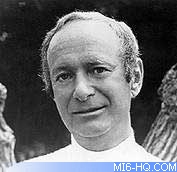
Above: Ernest Lehman |
|
Neal Purvis: And he was hospitalised I believe
and Clifford Odets came in …
Robert Wade: No he went off on a cruise.
Neal Purvis: Who did?
Robert Wade: Ernest Lehman.
Neal Purvis: Ah, but I don't know, I mean I don't
know who did what.
|
Robert Wade: No it's very difficult to tell. The interesting
thing is that I wanted to show a clip from North by North West
because that's another Ernest Lehman movie and it's completely
different. The only reason why I didn't think it was a good idea
to show it is because it goes on and on and on but it's only
when you show it as a clip that it goes on and on and on. If
you watch it in the context of the movie, it's just … but
I won't go on about that.
Peter Florence (Chair): But his versatility is something
you admire.
Robert Wade: He's a fantastic writer. His structure
is always really rigorous. He wrote so many movies. He wrote The
Sound of Music, North by North West which almost invented a genre
which really is effectively what the Bond movies inhabit and a
movie like that which I can't imagine being made nowadays, so
he's, I think he's still alive, he's done pretty well.
Peter Florence: Tell me about Let Him Have
It, because the Bentley case was not in the public arena
at the time that you chose to write about it.
Robert Wade: No that's right, um …
Neal Purvis: Well I mean, someone we knew actually
came to us and told us about the story of it because Bentley
had gone to his school many years before and it was known
in that school that story so we went and tried to find
some books on it and there weren't any books in print.
We went to The British Library funnily enough, and …
Robert Wade: Yeah, not here. |
|
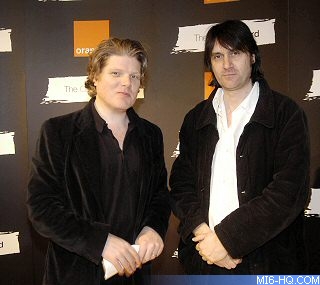
Above: Robert Wade and Neal Purvis at The Orange Word session
at the British Library, London. |
Neal Purvis: : … no, oh no, no and there was a
book that was ghost written by Bentley's father and it was a
bit,
I mean it was sort of something they'd serialise in The Mirror
in those days and it was, you couldn't believe everything in
it,
but there was something very awful about it coming from the father's
point of view and …
Peter Florence: What, because the father was a war hero
and …
Robert Wade: Well he was just an ordinary man and reading
this account of an ordinary, you know patriotic man's helplessness
at seeing his son being inexorably led to death was incredibly
depressing but very effecting and we, we were aware that there
had been quite a few attempts to make a movie out of that story.
|
Peter Florence: What was the story, as you understood
it, the story bit of it?
Robert Wade: Well the story for us was it was
about two guys …
Neal Purvis: Having fun.
Robert Wade: … yeah, they were both sort
of retarded, well not really, one of them was kind of hyperactive
is what you'd say now I suppose and one of them was retarded
and they didn't fit in, there wasn't a world for them in
those days. There wasn't, there was no place to go as a
teenager, I don't think the word had even been coined and
they'd found a kind of common ground in comics and dressing
up as gangsters and gangster movies so it was about these
two boys having fun and then it all goes terribly wrong
and a policeman gets killed because there were a lot of
guns floating around after the war so …
|
|
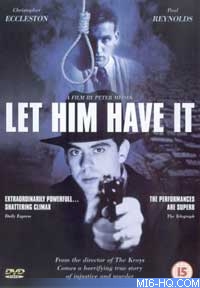
Above: Let Him Have It (1991)
|
Peter Florence: What year are we in?
Robert Wade: '52. So suddenly this boy is in the hands
of the law and an example must be made and we felt that the actual,
there are lots of in and outs about what really happened, but
we felt that even the official version of events was so terrible
to look at from the outside that it would make a good story and
we didn't need to bang a drum.
Peter Florence: And terrible because Bentley should
have been treated as someone with diminished responsibilities.
Robert Wade: Yes he was, he had a mental age of 11,
wasn't it?
Neal Purvis: 11½
Robert Wade: Yeah.
Peter Florence: And was this recognised at the time?
Neal Purvis: Well it was very difficult because they
didn't have, I mean they had a test for sort of whether you were
mentally able to stand trial and it was a bit 'of its day' and
he came across as trouble because he was slow so I can understand
the situation, you know, in a sense he was there and he was involved
in it but it was just of its day that they couldn't spot it. In
those days they would put you to death within, I mean he went
within three months of the actual event so you didn't really have
a lot of time to make a case and it happened to be that there
had been a lot of trouble around. Some policemen or something
had been shot in Shepherds Bush and they were really out to get
anyone who was going to cause any trouble.
Peter Florence: Rather than focusing on the miscarriage
of justice, you, I think in this film, focused upon the impact
on the family and the relationship between then didn't you. Would
you just like to introduce what we're going to see?
Robert Wade: So this is the terribly melodramatic moment
of the family saying goodbye to this boy who didn't know, he didn't
grasp that he was about to be hanged and this is really taken
from the family's account of what happened and we, I don't think
there's any writing going on, it's just…
Neal Purvis: Record.
Robert Wade: … serving up reality and then it's
filtered through actors and direction and everything.
[Clip of Let Him Have It shown] Click
to see the trailer
Peter Florence: This as a very British film was your
big passport wasn't it?
Neal Purvis: Well we thought it was going to be a passport
but it didn't really, the film business was in such a state in
those days we, I mean we thought the phone wouldn't stop ringing,
but it didn't ever start.
Robert Wade: I mean we wrote this thing and it got
made which was really kind of, you know you have to be incredibly
luck to get a film made but particularly then, I think there
were four British movies got made that year and …
|
Neal Purvis: And because of the publicity it
had caused they decided to, rather than do a small opening,
which is probably what it should have had, they decided
to put it on at the Odeon Leicester Square …
Robert Wade: Which is, that's the biggest cinema in
Europe so it was sort of, you know, when you've got a 2,200
seat auditorium, even if a 1,000 people are there it feels
half empty and you know it wasn't really the right place
to open that movie, it was only a little film but …
|
|

"...you have
to be incredibly lucky to get a film made but particularly
then, I think there were four British movies that got
made that year..." |
Neal Purvis: And we went and stood …
Peter Florence: But in America it wasn't loaded with
all the political baggage that it was over here.
Robert Wade: On no that's right and it got fantastic
reviews and I just think that the humanity of it is … well
I think the thing was that we weren't trying to bang a drum about
it and that made the story survive and it touched people because
of that. I think if it had been sort of an agitprop movie it would
have turned people off.
Peter Florence: There is - not that I'm suggest a morbid
- but there is a theme running throughout your work of execution
and the dubiousness of crime isn't there?
Robert Wade: Yeah it's interesting because you kindly
invited us to be here tonight and we sort of looked at things
that we'd done and I started noticing nooses and the kind of thing,
little emblems but I think that obviously it doesn't happen everyday
but these things really do happen and it creates an intensity
in life if there's someone about to get the chop.
Peter Florence: The other thing that I think, and we
will examine how this pertains to James Bond in a while, there
is a real desire to engage with or to put in very substantial
pieces of conversation or dialogue (and dare I say it philosophy?)
into your films sometimes that are also represented in the clip
from Josey Wales that you want to show. I'd just be interested
to know why you chose this part of Josey Wales rather than any
of the other stuff that is fun or comic?
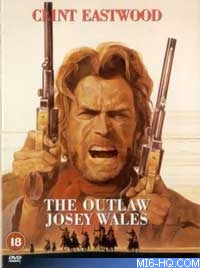
Above: The Outlaw Josey Wales (1976) |
|
Robert Wade: I mean personally I think it's a
fantastic movie. I think Clint Eastwood is one of the giants
and I think it's a sort of overlooked movie in a way and
I've always remembered this exchange. It's funny, when we're
working we have a shorthand and even with the people that
we work with we have a shorthand and you can refer to this
scene in one line, it's that 'you have iron in your words',
that may not be the right line, but I just think that it
combines philosophy and character and entertainment all
in one - what I thought was a sort of three minute moment,
it's more like five minutes.
Peter Florence: But it's a great five minutes.
Neal Purvis: Indeed.
[clip from The Outlaw Josey Wales shown] Click
to see the trailer
|
Peter Florence: Now the glory of that is that they
take one of the greatest clichés of Westerns and give
it this fantastic context, but as you said, they've earned that
very long, very intense, really laden dialogue haven't they?
Robert Wade: I reckon so. No I think that's right. I
think that obviously it's funny seeing these things out of context
but it moves into a different area where you kind of know that
this is saying more than, it's more than just cowboys and Indians
and it's relevant now, but I don't think that you could have a
scene like that today, unfortunately. There's a sort of, the pressure
on the script is so intense that you might start off with a draft
like that and it would be cut down and cut down.
Peter Florence: The pressure to deliver what?
Robert Wade: To get the idea across in as quick as possible
way without repetition. I mean you pointed out when we looked
at that earlier that there was a kind of, it does repeat itself
in certain ways and you feel, I don't know, do you feel uncomfortable
seeing that?
Peter Florence: Well no I feel kind of thrilled actually
seeing it because I'm very used to being hurried through every
scene.
Robert Wade: Well that's what we nowadays, you know
writing scripts, it's really difficult. I mean that's Philip Kaufman
writing for Clint Eastwood, a strong director and a strong producer
who can control it and maybe even in those days, that was a luxury
I don't know, but it seems like a luxury now.
Peter Florence: There's something else about that film
which is why I was interested that you chose it, which is the
tone of the whole thing, and I would just like to kind of refer
that to a movie you wrote, Plunkett & Macleane which didn't
work, for various reasons. I am interested to know why you think
it didn't work, or if you think it didn't work.
Robert Wade: Well we re-wrote it and then we got re-written
so all the good bits are by us.
Neal Purvis: Yeah, I mean there isn't a great deal of
our dialogue left in that film to be honest and you know we'd
done a lot of research into that period and it was quite enjoyable.
Peter Florence: This period is?
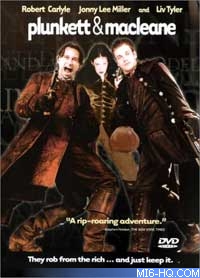
Above: Plunkett and Macleane (1999) |
|
"There
isn't a great deal of our dialogue left in that film
to
be honest..."
Neal Purvis: 17th century.
Robert Wade: 18th century actually.
Peter Florence: And Plunkett and Macleane are?
Robert Wade: One is an apocrypha and the other
is a fop and it's a true story and a man called Selwyn Roberts
wrote a script based on it, which was good. He found the
story and he wrote the script and then it …
Peter Florence: What's the story?
Robert Wade: They teamed up. It was a kind of
unlikely teaming but they were highwaymen so if you were
going through Hyde Park, which was the King's road to Kensington…
|
Peter Florence: And was then country.
Robert Wade: … it was country. That's why the barracks
are there now, it's that there were so many highwaymen that people
used to gather under a bell on a tree to get into a group so that
they could move through the park to get to Kensington and the
barracks are still there because to make the road safe they barracked
troops there in tents, but now they've got a big tower and um
… what were we talking about?
Neal Purvis: I don't know.
Peter Florence: I'm talking about the story of Plunkett
& Macleane and what you did because I think what's interesting
about Josey Wales as what's interesting about Butch Cassidy and
other similar adventure movies which involve a lot of killing
is that they have quite often a freshness and humour of tone which
I kind of understand is what your version of the script was, that
is entirely lost in the way that it's been shot by Jake Scott.
Robert Wade: I don't know, I think that there's a sort
of delicate thing with the film which is that, you're absolutely
right, tone is everything and Clint Eastwood can manage it beautifully
in a movie like that, where it's funny and entertaining and yet
it's got a real serious heart to it and you're right, Butch Cassidy
and the Sundance Kid the same thing but what happens when you're
making a movie and there isn't one kind of guiding hand and we
had re-written someone else, you know so it wasn't our baby. We
felt very strongly about it.
Peter Florence: How did you get to re-write it?
Robert Wade: It was a project that was sort of languishing
on the shelves at Working Title and it had about three or four
good writers on it, but it had just sort of gone into the dust
and we always liked the period and we liked the characters and
we came up with a new story for it. Am I going into too much detail?
Peter Florence: Do you know how Odets and Lehman worked
on it?
Neal Purvis: No, no, I mean it's just that we got the
job by coming up with a good beginning for it, which was seeing
someone swallow a jewel and then die and then two people go to
where he's been buried with the intention of digging him up and
cutting the jewel out of his body.
Robert Wade: I mean separately.
Neal Purvis: Yeah.
Robert Wade: Yes.
Neal Purvis: And that's how they meet and that's how
they team up.
Robert Wade: And then one of them swallows the jewel
again having cut it out of the body so it was a great beginning
obviously, but we sort of got to a point where we were very happy
with it but it's difficult because people always want to spend
a bit more money on the script and we sort of feel now that if
you've got the script at about 80% then you enter a dangerous
point where you can keep working on it and throw the baby out
with the bathwater or you can say it's going to be, if we shoot
that really well, that will be pretty good. We prefer to sort
of get to 80% and then not muck about with it, because the tone
can completely go with just a few changes.
Related Articles:
 Interview - Neal Purvis
and Robert Wade (Part 1)
Interview - Neal Purvis
and Robert Wade (Part 1)
 Interview - Neal Purvis
and Robert Wade (Part 3)
Interview - Neal Purvis
and Robert Wade (Part 3)
 Interview - Neal Purvis
and Robert Wade (Part 4)
Interview - Neal Purvis
and Robert Wade (Part 4)
 Interview - Neal Purvis
and Robert Wade (Part 5)
Interview - Neal Purvis
and Robert Wade (Part 5)
 MI6 "The World is Not Enough"
Coverage
MI6 "The World is Not Enough"
Coverage
 MI6 "Die Another Day" Coverage
MI6 "Die Another Day" Coverage
Many thanks to Peter Florence, Neal Purvis,
Robert Wade, Ellie Ward, The
Orange Word and The
British Library. Transcript courtesy The Orange Word. Image
courtesy Amazon Associates and The Orange Word